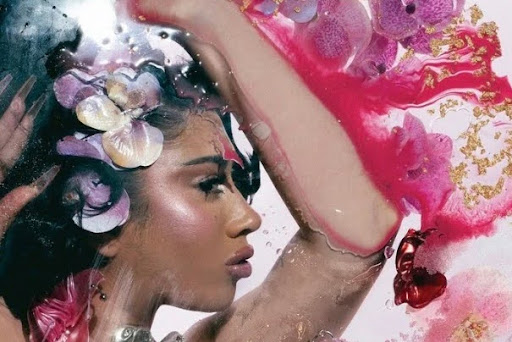Kali Uchis has long been an artist who resists easy categorization. Whether through her sultry R&B, Latin pop flourishes, or experimental productions, she’s carved a unique space in the musical landscape. On her latest album Orquídeas, Uchis stretches further into the intersection of cultural identity and sensuality, weaving Colombian rhythms into a sleek modern soundscape. It’s a record that feels equally at home on the dance floor as it does in moments of quiet reflection, all while being deeply rooted in Uchis’ heritage.
The title Orquídeas is more than a floral metaphor—it’s an intimate connection to her roots. The orchid, Colombia’s national flower, represents both beauty and fragility, and Uchis adopts this duality as the basis for the album. The music mirrors the flower’s delicate complexity, unafraid to show its vulnerable underbelly. In both the sensuality of her voice and the warmth of her production, Uchis lays bare emotions that are at once radiant and tumultuous.
The album opens with “¿Cómo Así?” (“How Come?”), a track that immediately sets the tone for Orquídeas‘ exploration of romantic allure. Uchis’ breathy, almost teasing delivery is matched by a rhythmic dance track that fizzes with infectious energy. She sings, “I make ‘em beg for it,” a declaration of romantic dominance that could be as playful as it is intentional. The track’s hyper-pigmented beats and seamless transitions between Spanish and English create a feeling of fluidity that continues throughout the album, reflecting Uchis’ seamless navigation of both language and genre. In many ways, this song is a mission statement for the record—romantic, confident, and deeply aware of the power dynamics at play in love.
That bilingual fluidity is a hallmark of Uchis’ style. In “Me Pongo Loca” (“I Get Crazy”), she slips easily between English and Spanish, blending the sensuality of both languages into her performance. Lines like “pero tampoco soy hecha de hielo / yeah, I get a little bit / I get a little crazy” show Uchis’ ability to play with vulnerability and strength in a single breath. Her voice, sliding between the two languages, becomes a metaphor for the fluidity of her identity—her connection to the diaspora is palpable, and her music is a reflection of that rich, complex heritage.
While Orquídeas’ songs feel at times like a fluid exploration of intimacy, they also dive into the tension between the sacred and the sensual. “Igual Que Un Ángel” (“Just Like An Angel”), one of the album’s standouts, merges religious imagery with a romantic idealization that feels as much celestial as it does earthly. Uchis sings of a woman “sent from Heaven down to Earth,” an unattainable vision of beauty that is as much about longing as it is about self-presentation. In this song, Uchis’ vocal performance—delicate and ethereal in the falsetto opener—creates the sense of a figure that is both angelic and deeply human, fragile and powerful in equal measure.
Her exploration of womanhood as both idealized and self-empowered continues on “Diosa” (“Goddess”), a track that’s both a celebration of self-empowerment and a commentary on the male gaze. Uchis’ vocals, reminiscent of Amy Winehouse’s smoky, jazzy inflections, glide over the airy production before diving into reggaeton beats, as if to challenge the listener to reconcile the sacred and the profane. In the chorus, Uchis proclaims herself “la reina, la diva, la diosa” (“the queen, the diva, the goddess”), using the definite article “la” to signify ownership of these titles—she is, in essence, reframing the narrative of womanhood from object to subject, the gaze of the lover reflecting her own self-possession. The reggaeton pulse beneath the track gives her assertion weight, turning what could have been a passive expression of desire into an anthem of control.
In “Te Mata” (“It Kills You”), Uchis brings a vintage Latin touch with a bolero-style arrangement, layering string sections over her emotionally charged vocals. It’s a song of revenge, a breakup track reimagined through the lens of personal triumph. “Por fin estoy feliz, mis días ya no son gris” (“I’m finally happy, my days are no longer gray”) is both catharsis and celebration, marking the end of despair and the beginning of a self-realized joy. The combination of the vintage Latin flair and Uchis’ emotionally charged performance illustrates her ability to bridge the past and present, using both to craft a narrative that feels timeless and personal.
The rest of the album continues to build on this sense of transformation. “Muñekita” (“Little Doll”) injects a dose of reggaeton energy, with Uchis’ flow locking into the beat, her words playing with the idea of womanhood as both a performance and an assertion of power. The lyric “Tu angelita es lo que necesitas” (“Your little angel is what you need”) is cheeky, yes, but also self-aware—there’s a wink in her delivery that suggests she’s not just playing the part but reimagining it altogether. The album ends with “Dame Beso // Muévete” (“Give Me A Kiss // Move It”), a track that evokes the nostalgia of 90s merengue and Dominican folk music. The song is a high-energy close, balancing the album’s sultry moments with something more celebratory, a joyful reminder of the warmth and passion of Latin culture.
Throughout Orquídeas, Uchis manages to blur the lines between genres, cultures, and identities with a deftness that feels as natural as her bilingualism. She moves from the introspective ballads to pulsating reggaeton with ease, layering influences from R&B, Latin pop, and soul into a cohesive vision. It’s an album that embodies both her growth as an artist and her unshakeable connection to her roots. While Uchis has often straddled the line between commercial success and niche appeal, Orquídeas feels like a true moment of artistic fruition, a space where her multiple identities—Colombian, American, artist, and woman—are allowed to exist in harmony. And in that sense, like the orchid, Uchis is at her most vibrant when she is fully blooming.

